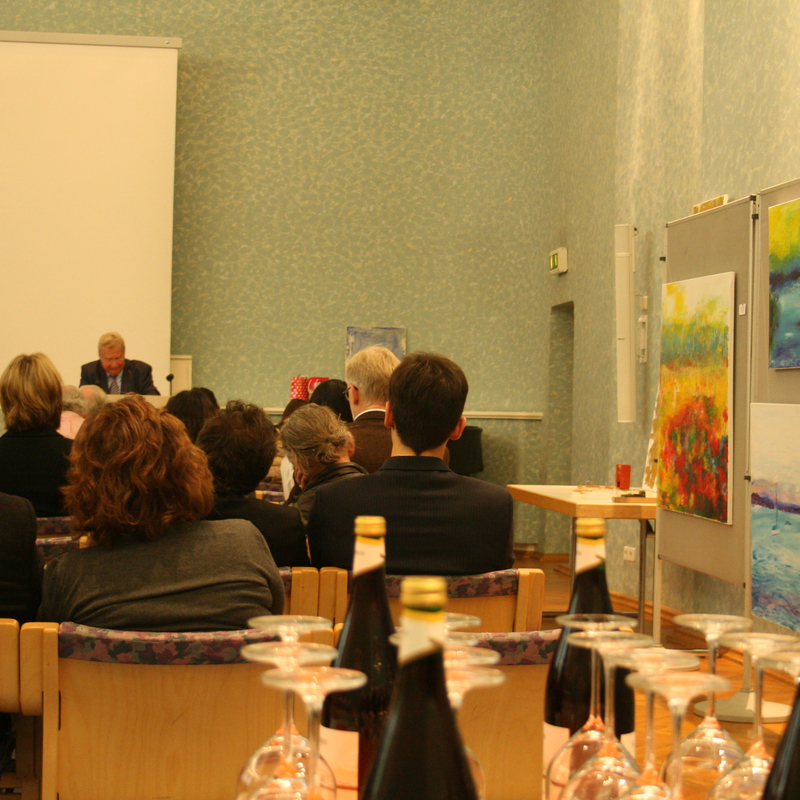Search
Special Issue: Symposium “Science, Ethics and Arts”
DOI: 10.17160/josha.3.6.250
This special issue of JOSHA is dedicated to the coverage of the second Symposium “Science, Ethics and Arts” that took place on Friday, October 14th at the Haus zur Lieben Hand, Freiburg. This event was organized by the International Master Program in Biomedical Sciences (IMBS) with the sponsorship of JOSHA Journal. In this issue, you will find the presentations of all the invited speakers as well as a coverage of the art exhibition that took place during the symposium. PICTURE: Evguenia Alechine.
The Scientific, Social and Ethical Aspects of Prolonging Human Life
DOI: 10.17160/josha.3.6.249
In his presentation, Prof. Borner discusses the varied aspects of prolonging life from a scientific, social and ethical perspectives. These different aspects are reviewed leading to the following recommendations: 1. We should try to improve early diagnosis and targeted treatment regimens to make the life of elderly people more bearable and enjoyable. 2. We have to accept that, at one point, our life ends and we have to give over our spirit and achievement to the next generation. 3. Enjoy every second of your life - Carpe Diem (Roman Poet Horaz, 65 B.C.9). 4. If you want to save lives, you should remove from every person in this world their driver‘s license.
Understanding Cancer by Whole Genome Studies
DOI: 10.17160/josha.3.6.248
The National Center for Tumor Diseases – NCT Heidelberg was founded as an exceptional alliance between the German Cancer Research Center (DKFZ), Heidelberg University Hospital (UKL-HD), the Heidelberg Medical Faculty, and German Cancer Aid (Deutsche Krebshilfe). The NCT MASTER project is situated at the interface of cancer genomics and clinical oncology to provide comprehensive molecular profiling to selected patients with unmet medical need, and to evaluate the utility of such an approach for informing choices regarding targeted therapy based on the molecular characteristics of the individual cancer. This multidisciplinary initiative has implemented a standardized workflow for patient selection, sample processing, molecular and bioinformatic analysis, technical validation of individual findings, and reporting of results through a dedicated molecular tumor board.
Bioethics and Philosophical Argumentation
DOI: 10.17160/josha.3.6.247
This presentation provides a philosophical introduction into the multilayered field of Bioethics. Firstly, it clarifies the somewhat confusing notion of "Bioethics", and then unfolds the key questions that bioethical debate faces today. The following third step discusses five obstacles to a broader discussion and possible solution of those bioethical problems – and gives four concluding hints to what needs to change in order to develop a more intense and open dialogue on those important challenges. PICTURE: Anna Boksa, Anja.
Conservation of biodiversity – ecology against economy
DOI: 10.17160/josha.3.6.246
Today we are confronted with a growing loss of biodiversity. All of us agree that we must do something to save the biodiversity. In his lecture, Prof. Hager focuses on the question what is the task of the law in this context. His lecture has three parts. In the first part, he discusses a famous case on biodiversity. The case opens the way to the second part where the efficiency of environmental law is discussed. In the third part, Prof. Hager outlines the structure of a modern ecological environmental law.
The 1971 War on Cancer Revisited
DOI: 10.17160/josha.3.6.245
Cancer is the second leading cause of death worldwide. President Roosevelt first established the National Cancer Institute and, later, President Nixon signed into law the National Cancer Act of 1971 to make the “Conquest of Cancer […] a national crusade”, declaring the “War on Cancer.” The worldwide research efforts focusing on the molecular and cellular biology and clinical spectrum of cancer have led to a better understanding of cancer as an acquired genetic disease, as well as to the importance of evolutionary processes in carcinogenesis and the clinical course of cancer. Based on these insights, novel therapeutic concepts have been developed and are already significantly improving the outlook for patients with cancer. PICTURE: Ludwig Köhler, Sculptures.
Arts at the Symposium "Science, Ethics and Arts"
DOI: 10.17160/josha.3.6.244
In this article, JOSHA's Editor Stephan Seiler reviews the arts exhibition that took place during the Symposium "Science, Ethics and Arts". Herein he presents the work of four artists with four different approaches: the photographer Anna Boksa, the young painter Giulia Musella, the internationally well-known artist John Tun Sein, and the sculptor Ludwig Köhler.
The Social Value of Knowledge in Medical Research
DOI: 10.17160/josha.3.6.243
The “socially valuable knowledge” (SVK) principle has been widely acknowledged as one of the most important guiding principles for research involving human subjects. In this presentation, Felicitas Holzer reconstructs the main arguments of the discussion between defenders and debunkers of the SVK principle and offer a third way to consider the social value of knowledge in research studies. PICTURE: John Tun Sein, Untitled 2016.
Ethics of clinical innovation. Now with video by J. Sugarman
DOI: 10.17160/josha.3.6.242
In this presentation, Dr. Mastroleo defends the view that clinical innovation should be understood, following Levine, as non-validated medical practice. Moreover, he argues that if this is the correct interpretation of clinical innovation this implies that the ethics of clinical innovation are different from (some) clinical research and validated medical practice. PICTURE: Anna Boksa, "Damian". Addendum April 13, 2019: As one of the world experts in ethics of non-validated practice I think you would enjoy watching this discussion at the NIH: Sugarman, J. (2017). NIH VideoCast - Ethics Rounds: Offering Patients Innovative Therapy: When Is It a Good Idea? Retrieved May 24, 2018, from https://videocast.nih.gov/summary.asp?Live=21779&bhcp=1
Pathways in the regulation of clinical stem cell research: harmonization, “double discourse” and alter-standardization
DOI: 10.17160/josha.3.6.241
In this presentation, Dr. Vasen explores the regulatory developments in stem cell medicine in the main national jurisdictions. He claims that the field is undergoing a process of diversification and indetify three pathways of regulatory development: international harmonization, "double discourse" and alter-standardization. The presentation is based on previous work published together with Achim Rosemann, Gabriela Bortz, and Margaret Sleeboom-Faulkner. PICTURE: Giulia Musella, Woman on a flower meadow.









